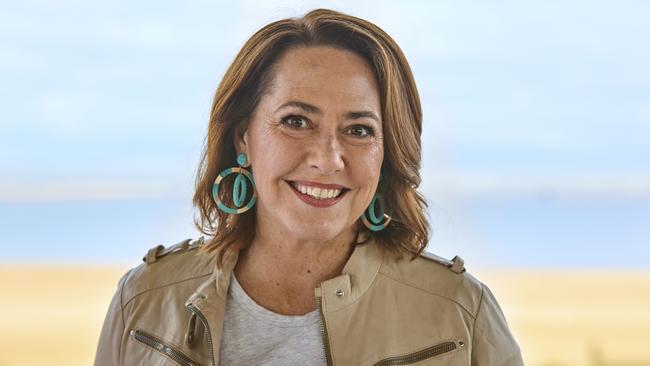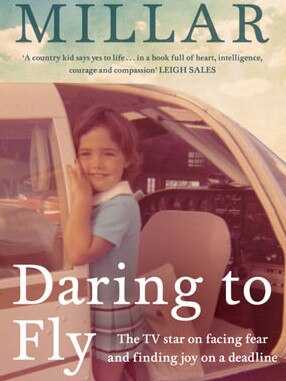Daring to Fly is a smooth landing by reluctant memoirist Lisa Millar
ABC host Lisa Millar’s struggle to turn the camera fully on to herself gives a clear insight into her temperament.

Often when I pick up a new book, I flip to the back and read the acknowledgments. In her warm and intimate memoir, Daring to Fly, Lisa Millar’s opening acknowledgment is wry: “To say I was a reluctant memoirist is to put it mildly.”
Now the co-host of ABC News Breakfast, for many years Lisa Millar was a foreign correspondent for ABC News, rising to bureau chief first in Washington DC and later in London. In short, she has achieved enormous success and spent much of her life showcasing the lives of others. To suddenly turn the spotlight on herself – an imperative for the memoirist – is quite a change of focus.
As a writer of fiction happiest when escaping into imaginary characters of my own creation, I can understand Millar’s reluctance to delve into her own life and release the findings out into the world.
Oddly enough, it is this reluctance that makes Millar’s memoir so very engaging. For it is Millar’s struggle to turn the camera fully on to herself that gives us such a clear insight into her temperament. She is a team player, a woman whose reliance on her family and her colleagues never goes unrecognised and who is loathe to take sole credit for achievements she insists must be shared.
Lisa Millar is a Queenslander, the fourth of five children raised in the small town of Kilkivan. Flying and planes are recurring themes in Millar’s memoir, beginning with her father’s obsession with aviation that culminates in the purchase of a small plane the family call India Echo Charlie.
The plane was kept in a hangar on the family’s farm in Kilkivan, which, because it had its own airstrip, was later used by the Australian skydiving team to prepare for the world championships to be held in what was then West Germany.
Given Millar’s familiarity with flying, it comes as a surprise to discover that, despite the frequent air travel required of a journalist, Millar later developed a fear of flying so great it became completely debilitating.
In her exploration of this fear and how she learned to manage it, we are given an intimate insight into the demands made of the foreign correspondent in the quest to get a story, and to try to get it first.
From the sticky tropics of Queensland, we follow Millar into cold European winters spent not curled inside by the fire but instead freezing outside at the scene of an unfolding news event. Millar’s account of life as a foreign correspondent is not replete with accounts of first class travel or luxury accommodation. Instead, she and her colleagues travel throughout the night, catching what sleep they can en route, memorably in a two-door Fiat barely able to contain Millar and camera operator Geoffrey Lye, let alone their six cases of camera gear.
But not only the weather, the transport and the accommodation exact a toll.
Journalism is a demanding mistress and the hours are long. Journalists must be ready to fly out on assignment at a moment’s notice. Sleep is a luxury on these occasions, as is make-up or even a change of clothes. So, too, relationships often fall victim to the demands of the job and Millar is careful but clear in her description of the price exacted in her own life.

As a reporter on life’s tragedies, Millar describes the devastating events she has witnessed over the course of her career. Her description of the last days of Van Nguyen, the young Australian sentenced to death in Singapore for drug smuggling, is heart-rending. Like Millar, I’d sobbed for the man and his family. Unlike Millar, I hadn’t been tasked with interviewing his grief-stricken mother.
Millar has the gift of clarity in her writing, no matter how complex the subject or how abstract the concept. In this way, Millar’s wry account of a simple trip to the dentist gives us a glimpse into the impact of covering trauma, while engaged as a journalist:
I told her I was good. All good.
“Any problems with the teeth?” she asked
“Nope. Everything is good.”
But was it? Because tears were soon dripping into the large plastic safety glasses Millar had been asked to wear.
“I wiped them away as her back was turned, arranging equipment on the bench ... her simple question had triggered something deep within me ... I began to sob and I couldn’t stop.”
Daring to Fly is a heartfelt and intimate memoir, recounted with a warmth and honesty that makes it the right companion for this homebound time.
Through Millar’s eyes, I saw the world anew – yes, filled with tragedy and sadness as so often it is, but also with adventure and promise and friendship and joy.
And as Millar describes the world unfolding before her as an awe-struck young journalist, I, too, was filled with wonder as I allowed myself to dream of a time when such discoveries will once again be possible.
Suzanne Leal is the online host of Thursday Book Club and co-host of the BAD All About Crime Podcast. Her latest novel, The Deceptions, is published by Allen & Unwin.



To join the conversation, please log in. Don't have an account? Register
Join the conversation, you are commenting as Logout